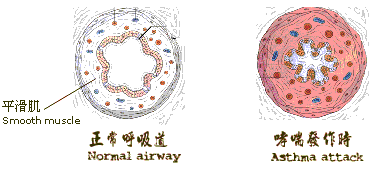|
 |
During asthma attack, the bronchial smooth muscle tightens and mucus blocks the air passage.
|
 |
Asthma is a lung condition where inflammation (swelling) and tightening of the airways causes difficulty breathing air into and out of the chest.
|
Different cells, most of them immune cells, produce this inflammation when triggered by contact with irritants. The inflammation blocks the airways, making it difficult to breathe normally.
|
Recurrent bouts of wheezing, breathlessness, chest tightness and coughing, usually at night or in the morning, are brought on by the inflammation.
|
| The inflammation is reversible, either spontaneously or with treatment but it can leave the airways more likely to overreact to various triggers. |
|
|
|
 |
Asthma is classified, in Traditional Chinese Medicine (TCM), as wheezing and/or panting syndromes. It was first described in the ancient medical book Summary of the Golden Chamber. Asthma was mentioned as a kind of "cough resulting from the ascending movement of qi (panting)." A narrowed airway caused a whistling sound during breathing, which was described as a "chicken sound in the throat." Another medical book, Treatise on the Causes and Symptoms of Disease (610 AD), also pointed out other asthma characteristics such as its "regular recurrence" in individuals.
Although both of these syndromes are associated with asthma in western medicine, they have distinct differences. The Chinese term for wheezing is "xiao." A wheezing syndrome is characterized by congestion with phlegm (bronchial secretions) and gasping which produces a whistling sound in the "throat." (The word "throat " refers to the whole respiratory tract). It also is associated with rapid breathing and shortness of breath. In severe cases, these symptoms cause difficulty lying down.
The Chinese term for panting is "chuan." A panting syndrome is characterized by rapid breathing, an open mouth, dyspnea (difficulty breathing) and elevated shoulders. Elevated shoulders occur when individuals have persistent difficulty breathing and need to use their shoulder muscles in addition to their chest muscles to support respiration. In western medicine, this is referred to as the use of accessory breathing muscles.
Wheezing and panting syndromes can occur simultaneously or alone. TCM treats asthma according to the classification patterns and symptoms the individual exhibits. |
|